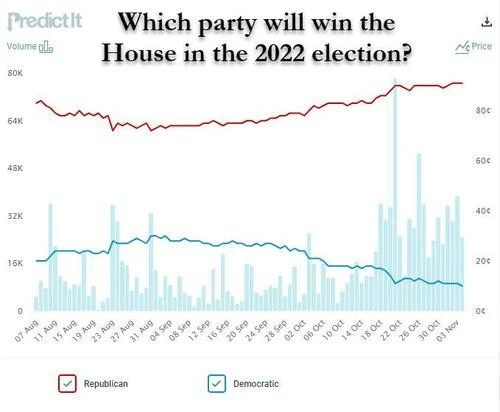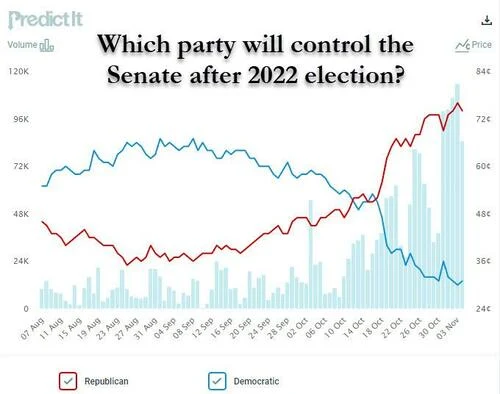By Brian Gardner, Stifel Chief Washington Policy Strategist, author of Potomac Perspective
A host of factors clearly signal a Republican takeover of the House. Although the battle for the Senate is closer, Republican candidates in key races have momentum and the GOP is well positioned to win the majority in the Senate. The baseline case is a Republican sweep. This note takes a final pre-election look at what to expect the election outcome(s) could mean for policy and markets.
The fundamentals of the midterm elections have favored Republicans. History points to significant Republican gains. Numerous polls suggest that voters are prioritizing issues that Republicans are running on, such as inflation, crime, and immigration while issues that might suggest a positive environment for Democrats, such as health care and abortion, are ranked as lower priorities by most voters. Also, polling might be underestimating Republican strength. New York Times chief political analyst Nate Cohn recently acknowledged a problem with “nonresponse bias” that occurs when some voters refuse to respond to a pollster’s call. The Times has found that white registered Democrats were 28 percent more likely to respond to the Times’ Senate polls than were Republicans. According to the Times, this disparity exceeds the nonresponse bias from their pre-election polling in 2020. Because of a political environment that favors Republicans, historical trends, and the potential underestimation of Republican performance in polls, it seems likely that Republicans will sweep both the House and Senate.
House
What’s at stake? All 435 seats are being contested. Republicans need a net gain of six seats to win the majority. A president’s party historically loses 27 seats on average in a midterm election during the president’s first term, so history plus polling data suggest that Republicans are well positioned to win control of the House. The Real Clear Politics average for the generic congressional ballot has Republicans leading Democrats by three points. Of note, in a recent generic poll conducted by CBS, Republicans held a 16-point lead among independent voters and 79 percent of independent voters rated the economy as bad (31 percent said the economy was “fairly” bad while 48 percent said it was “very” bad). Based on polling trends and ratings by independent political analysts, such as the Cook Political Report, a Republican gain of 15 to 25 seats seems likely – with higher gains possible (Note: Democrats lost 13 House seats in the 2020 election which is unusual for the party of an incoming president; this could cap Republican gains).
Senate
What’s at stake? Thirty-five seats are being contested (21 seats currently held by Republicans and 14 seats currently held by Democrats). Republicans need a net gain of one seat to take control of the Senate while Democrats can retain the majority if they maintain the current 50-50 split. The following is a list of the eight key races and our forecast followed by a list of potential surprise races.
Republican Targets:
- Arizona – Sen. Mark Kelly v. Blake Masters. RCP average (as of November 3): Kelly +2.0. Forecast: D hold.
- Georgia – Sen. Raphael Warnock v. Hershel Walker. RCP average: Walker +0.5. Note: If the winner in GA does not win a majority, the state holds a runoff of the top two candidates in December. Forecast: R gain.
- Nevada – Sen. Catherine Cortez-Masto v. Adam Laxalt. RCP average: Laxalt +1.9. Forecast: R gain
- New Hampshire – Sen. Maggie Hasson v. Don Bolduc. RCP average: Bolduc +0.3. Forecast: R gain.
Democratic Targets:
- North Carolina – Rep. Ted Budd v. Cheri Beasley. RCP average: Budd +5.0. Forecast: R hold.
- Ohio – J.D. Vance v. Rep. Tim Ryan. RCP average: Vance +3.3. Forecast: R hold.
- Pennsylvania – Dr. Mehmet Oz. v. Lt. Gov. John Fetterman. RCP average: Oz + 0.3. Forecast: R hold.
- Wisconsin – Sen. Ron Johnson v. Mandela Barnes. RCP average: Johnson +3.2. Forecast: R hold.
Possible Senate Surprises
If Republicans outperform expectations, they could surprise and also gain Senate seats in Colorado, Connecticut, and/or Washington state. Some polls suggest a close race in Washington despite the state being reliably Democratic. In Iowa, Sen. Chuck Grassley (R) is seeking his eighth term. A Seltzer/Des Moines Register poll last month indicated a closer than expected race. While Grassley is still favored, there could be a surprise here if voters opt for a generational change. Lastly, in Alaska, Sen. Lisa Murkowski (R) is favored to win reelection, but the state uses ranked choice voting whereby voters rank their choices and if the lead candidate fails to win a majority then the last place candidate’s votes are redistributed to the remaining candidates based on voter preferences until a winner achieves a majority of the vote. A field that includes a candidate backed by former President Donald Trump could complicate Murkowski’s chances.
Our forecast: Republicans gain three Senate seats.
What it Means
A Republican win in either the House or Senate would lead to legislative gridlock,
which equity markets have historically welcomed. Markets would,
generally, react positively to the removal of the risk of higher tax
rates as well as a lower growth rate in federal government spending.
Although equity markets could react positively to a Republican victory,
there are political risks as the risk of government shutdowns rises.
Also, political drama related to future debt ceiling standoffs could
increase market volatility and, if a situation similar to the standoff
in 2011 is repeated, there could be a risk-off trade as a result. In a
recession, divided government would limit the chances of any
type of fiscal response which would, in turn, complicate the Federal
Reserve’s task of balancing its dual mandate [ZH: something we said back in January]
If Republicans win, energy and defense could be the biggest sector winners. In the case of defense, though, investors should not be overly exuberant about increases in defense spending levels as Democrats will continue to have leverage on Capitol Hill and could resist Republican efforts to significantly increase defense spending. A Republican win could also boost chances of passing cryptocurrency legislation since it is a priority for Rep. Patrick McHenry (R-NC) who would presumably chair the House Financial Services Committee if Republicans win the House. Cryptocurrency is one of the few issues on which Congress could act in 2023-2024 since the issue tends to cut across party lines and is not impacted by partisanship in the same way other issues are affected. Social media and technology would probably see little impact from a change in control in Congress as these sectors have critics in both parties. However, the recent change in control at Twitter could slow efforts to revise Section 230 of the Communications Decency act as Republicans assess what the change in ownership means.
A Republican win in the Senate could slow the Biden administration’s regulatory policy but probably not as much as some investors think. The theory is that a Republican Senate can block nominations to regulatory posts. However, key federal agencies are already under Democratic leadership and will remain so. In cases where a future vacancy occurs, the Biden administration can bypass the Senate and appoint “acting” agency heads, a tactic used during the Trump administration.
If expectations are wrong and Democrats retain control of the House and Senate, markets might selloff. However, there is still likely to be a level of gridlock as the Senate majority would likely remain tightly split and Democrats have shown how difficult it is to pass the Biden agenda through a 50-50 Senate. In reality, Democrats would need to gain 2-3 Senate seats in order to pass legislation. It is also worth noting that there is little new on the party’s agenda. If Democrats win, most of their agenda would be to return to unfinished business from 2021-2022.


